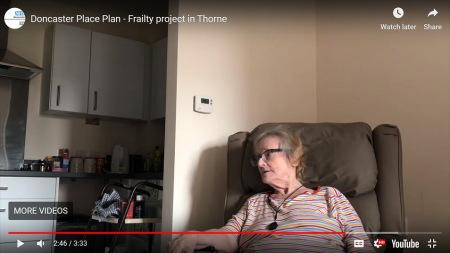
Integrated Care in Action Week – Case Study – Elisabeth in Doncaster
As part of Integrated Care in Action week (9-15 March), South Yorkshire and Bassetlaw Integrated Care System takes a look at what is happening in one of our Places.
In Doncaster, their frailty project in Thorne is an example of integrated care in action in which local health and care staff are trialling a jointly-created care plan.
By coordinating a single, holistic assessment based on what is important to the person - and their strengths. In doing so this also minimises risks such as falls in the home, mobility, pain control and resultant mental health problems such as low mood, anxiety and depression.
An example of how integrated care has multiple benefits for patients is the wrap around support Elisabeth is receiving to address a number of ongoing health issues.
Elisabeth has a history of painful Rheumatoid Arthritis and decreasing mobility managed by, various different pain control medications.
Prior to the assessment, Elisabeth required two carers and consideration was even given to install a ceiling-track hoist, or admit her into a care home.
On this recent occasion, rather than having multiple assessments at different times and by different organisations, a single assessment by a skilled multi-disciplinary team undertook a coordinated assessment of Elisabeth’s health and wellbeing.
As a result, this holistic approach ensured that Elisabeth’s needs were carefully noted and reviewed through this joined-up approach. An example of this work included a full medication review resulting in reduced, and more appropriate, medicines to support her pain management with a better outcome.
This joined-up approach also led the team to identify an opportunity for a physiotherapy referral. This would help Elisabeth maintain her independence. As a result of this intervention, Elisabeth walked with her frame for the first time in a number of months the very next day.
Jo Forrestall, Head of Strategy & Delivery for Intermediate Care, NHS Doncaster Clinical Commissioning Group said: “The frailty programme is working at pace to develop an integrated model of care, focussing on the needs of older people that need help and support to maintain and improve their health, wellbeing and independence.
“This approach means that we listen more the patients’ story, they tell this only once and we address all their concerns including the wider determinants of health.
“The frailty programme is still in its infancy, but it is pleasing to see how this new approach is supporting and of benefit to patients in many different ways.”
Rachael Webb, Clinical Leadership Fellow, specialising in the Integration of Elderly Care Services at Doncaster and Bassetlaw Teaching Hospitals NHS Foundation Trust said: “People living with frailty and their family carers often experience deteriorating physical and mental health, often with one or more long-term conditions, sometimes including dementia.
“Individuals with frailty are likely to be coming towards, or in the last stage of their lives and can often experience crises in their physical and mental health, resulting in frequent attendance at the Emergency Department or in unplanned, emergency admissions to hospital.
“This is one of the reasons why the frailty programme is so important – to ensure health issues and concerns are identified and addressed as quickly as possible, preventing hospital admission.”
ENDS
